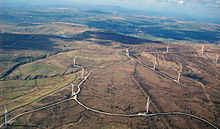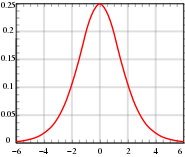| Main page | New articles & Tasks |
 The Energy Portal Welcome to Wikipedia's Energy portal, your gateway to energy. This portal is aimed at giving you access to all energy related topics in all of its forms.
|
Page contents: Selected article • Selected image • Selected biography • Did you know? • General images • Quotations • Related portals • Wikiprojects • Major topics • Categories • Help • Associated Wikimedia |
Introduction
Energy (from Ancient Greek ἐνέργεια (enérgeia) 'activity') is the quantitative property that is transferred to a body or to a physical system, recognizable in the performance of work and in the form of heat and light. Energy is a conserved quantity—the law of conservation of energy states that energy can be converted in form, but not created or destroyed; matter and energy may also be converted to one another. The unit of measurement for energy in the International System of Units (SI) is the joule (J).
Forms of energy include the kinetic energy of a moving object, the potential energy stored by an object (for instance due to its position in a field), the elastic energy stored in a solid object, chemical energy associated with chemical reactions, the radiant energy carried by electromagnetic radiation, the internal energy contained within a thermodynamic system, and rest energy associated with an object's rest mass.
All living organisms constantly take in and release energy. The Earth's climate and ecosystems processes are driven primarily by radiant energy from the sun. The energy industry provides the energy required for human civilization to function, which it obtains from energy resources such as fossil fuels, nuclear fuel, renewable energy, and geothermal energy. (Full article...)
Selected article
Scout Moor Wind Farm is the second largest onshore wind farm in England. The wind farm, which was built for Peel Wind Power Ltd, produces electricity from 26 Nordex N80 wind turbines. It has a total nameplate capacity of 65 MW of electricity, providing 154,000 MW·h per year; enough to serve the average needs of 40,000 homes. The site occupies 1,347 acres (545 ha) of open moorland between Edenfield, Rawtenstall and Rochdale, and is split between the Metropolitan Borough of Rochdale in northern Greater Manchester and the Borough of Rossendale in south-eastern Lancashire. The turbines are visible from as far away as south Manchester, 15–20 miles (24–32 km) away.
A protest group was formed to resist the proposed construction, and attracted support from the botanist and environmental campaigner David Bellamy. Despite the opposition, planning permission was granted in 2005 and construction began in 2007. Although work on the project was hampered by harsh weather, difficult terrain, and previous mining activity, the wind farm was officially opened on 25 September 2008 after "years of controversy", at a cost of £50 million. (Full article...)
Selected image

Photo credit: Luc Lviatour
Electricity ionizing the gas in a plasma lamp.
Did you know?
- The Stuart Shale Oil Plant (pictured) in Australia was in operation only five years?
- Atlantic LNG Company of Trinidad and Tobago operates the world's largest LNG train?
- Despite projections of producing four times as much power as it used in heating, the Riggatron fusion reactor was never built due to a lack of funding?
- In the late 1980s, as many as 50 percent of Argentina's thermal power plants had to be shut down due to lack of maintenance, causing a supply crisis?
- Kashiwazaki-Kariwa Nuclear Power Plant in Japan, the largest nuclear power plant in the world, was shut down after being hit by the Chūetsu offshore earthquake in July 2007?
- The world's largest surface oil shale pyrolysis reactor is Petrosix, operated by the Brazilian oil company Petrobras?
- Russia plans to build several floating nuclear power stations?
- Shale gas, a form of natural gas extracted from shale, may also refer to oil shale gas?
Selected biography
Born in Texas, Hubbert studied geology, mathematics, and physics at the University of Chicago. He pursued his Ph.D. while working for the Amerada Petroleum Company, then worked for the Shell Oil Company from 1943 until 1964. On leaving Shell he became a senior research geophysicist for the United States Geological Survey until retiring in 1976. Hubbert was also a professor at Stanford University and at UC Berkeley.
Hubbert is most well-known for his studies on the capacities of oil fields and natural gas reserves. He predicted that, for any given geographical area, the rate of petroleum production over time would resemble a bell curve. At the 1956 meeting of the American Petroleum Institute, Hubbert predicted that United States petroleum production would peak in the late 1960s or early 1970s. He became famous when his prediction came true in 1970.
In 1974, Hubbert projected that global oil production would peak in 1995 "if current trends continue". Various subsequent predictions have been made by others as trends have fluctuated in the intervening years. Hubbert's theory, and its implications for the world economy, remain controversial.
In the news
- 22 August 2024 – Russian invasion of Ukraine
- The International Atomic Energy Agency announces an investigation of the Kursk Nuclear Power Plant following accusations from Russia that a Ukrainian drone targeted the power plant. (Reuters)
- 22 August 2024 – Belarus–China relations
- Belarus and China agree to greatly strengthen mutual trade, financial, energy, and security cooperation, which includes enhancing industrial supply chains and collaboration with the Guangdong-Hong Kong-Macau Greater Bay Area. (Reuters)
- 18 August 2024 – 2024 Lebanese blackout
- Ongoing nationwide blackouts in Lebanon caused by fuel shortages provoke significant governmental conflict, with the Minister of Energy blaming the Central Bank for not paying Iraq for fuel imports and the Central Bank blaming Parliament for not authorizing emergency fund transfers for fuel payments. (Asharq Al-Awsat)
- 17 August 2024 – Russian invasion of Ukraine
- The International Atomic Energy Agency declares that the safety of the Zaporizhzhia Nuclear Power Plant is deteriorating, following an investigation into an explosive drone strike that targeted a perimeter access road at the power plant. (Reuters)
General images
Quotations
- "My administration is committed to a leadership role on the issue of climate change. We recognize our responsibility and will meet it - at home, in our hemisphere, and in the world." – George W. Bush, 2001
- "While the Kyoto Protocol is a crucial step forward, that step is far too small. And as we consider how to go further still, there remains a frightening lack of leadership." – Kofi Annan, 2006
- "It is going to be very difficult to keep temperature increases down to between 2 and 3 degrees centigrade [3.6 - 5.4°F]. We should work very hard to do that." – Nicholas Stern, 2006
- "Halting global warming requires urgent, unprecedented international cooperation, but the needed actions are feasible and have additional benefits for human health, agriculture and the environment." – James E. Hansen, 2004
Related portals
WikiProjects
WikiProjects connected with energy:
Other WikiProjects that may be of interest:
Major topics
Major categories
National energy supply, use & conservation
National electricity sector
Politics, economics, environment
- Climate change
- Energy conservation
- Energy economics
- Energy crises
- Energy development
- Energy policy
- Peak oil
Energy sources
- Fuels
- Biofuels
- Fossil fuels
- Fusion power
- Nuclear technology
- Renewable energy
- Energy conversion
- Electric power
- Energy storage
Energy-related design
Scientific usage
Help

Puzzled by energy?
Can't answer your question?
Don't understand the answer?
- Ask at the reference desk
- Read the Wikipedia help pages
For further ideas, to leave a comment, or to learn how you can help improve and update this portal, see the talk page.
Associated Wikimedia
The following Wikimedia Foundation sister projects provide more on this subject:
-
Commons
Free media repository -
Wikibooks
Free textbooks and manuals -
Wikidata
Free knowledge base -
Wikinews
Free-content news -
Wikiquote
Collection of quotations -
Wikisource
Free-content library -
Wikiversity
Free learning tools -
Wiktionary
Dictionary and thesaurus



























































































































































































